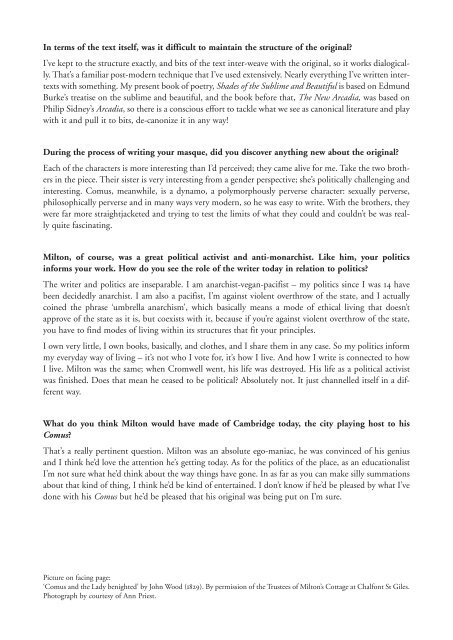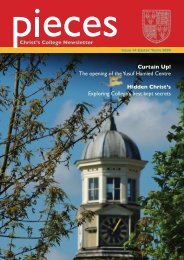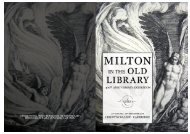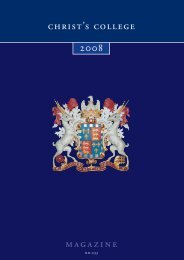here - Christ's College - University of Cambridge
here - Christ's College - University of Cambridge
here - Christ's College - University of Cambridge
You also want an ePaper? Increase the reach of your titles
YUMPU automatically turns print PDFs into web optimized ePapers that Google loves.
In terms <strong>of</strong> the text itself, was it difficult to maintain the structure <strong>of</strong> the original?<br />
I’ve kept to the structure exactly, and bits <strong>of</strong> the text inter-weave with the original, so it works dialogically.<br />
That’s a familiar post-modern technique that I’ve used extensively. Nearly everything I’ve written intertexts<br />
with something. My present book <strong>of</strong> poetry, Shades <strong>of</strong> the Sublime and Beautiful is based on Edmund<br />
Burke’s treatise on the sublime and beautiful, and the book before that, The New Arcadia, was based on<br />
Philip Sidney’s Arcadia, so t<strong>here</strong> is a conscious effort to tackle what we see as canonical literature and play<br />
with it and pull it to bits, de-canonize it in any way!<br />
During the process <strong>of</strong> writing your masque, did you discover anything new about the original?<br />
Each <strong>of</strong> the characters is more interesting than I’d perceived; they came alive for me. Take the two brothers<br />
in the piece. Their sister is very interesting from a gender perspective; she’s politically challenging and<br />
interesting. Comus, meanwhile, is a dynamo, a polymorphously perverse character: sexually perverse,<br />
philosophically perverse and in many ways very modern, so he was easy to write. With the brothers, they<br />
were far more straightjacketed and trying to test the limits <strong>of</strong> what they could and couldn’t be was really<br />
quite fascinating.<br />
Milton, <strong>of</strong> course, was a great political activist and anti-monarchist. Like him, your politics<br />
informs your work. How do you see the role <strong>of</strong> the writer today in relation to politics?<br />
The writer and politics are inseparable. I am anarchist-vegan-pacifist – my politics since I was 14 have<br />
been decidedly anarchist. I am also a pacifist, I’m against violent overthrow <strong>of</strong> the state, and I actually<br />
coined the phrase ‘umbrella anarchism’, which basically means a mode <strong>of</strong> ethical living that doesn’t<br />
approve <strong>of</strong> the state as it is, but coexists with it, because if you’re against violent overthrow <strong>of</strong> the state,<br />
you have to find modes <strong>of</strong> living within its structures that fit your principles.<br />
I own very little, I own books, basically, and clothes, and I share them in any case. So my politics inform<br />
my everyday way <strong>of</strong> living – it’s not who I vote for, it’s how I live. And how I write is connected to how<br />
I live. Milton was the same; when Cromwell went, his life was destroyed. His life as a political activist<br />
was finished. Does that mean he ceased to be political? Absolutely not. It just channelled itself in a different<br />
way.<br />
What do you think Milton would have made <strong>of</strong> <strong>Cambridge</strong> today, the city playing host to his<br />
Comus?<br />
That’s a really pertinent question. Milton was an absolute ego-maniac, he was convinced <strong>of</strong> his genius<br />
and I think he’d love the attention he’s getting today. As for the politics <strong>of</strong> the place, as an educationalist<br />
I’m not sure what he’d think about the way things have gone. In as far as you can make silly summations<br />
about that kind <strong>of</strong> thing, I think he’d be kind <strong>of</strong> entertained. I don’t know if he’d be pleased by what I’ve<br />
done with his Comus but he’d be pleased that his original was being put on I’m sure.<br />
Picture on facing page:<br />
‘Comus and the Lady benighted’ by John Wood (1829). By permission <strong>of</strong> the Trustees <strong>of</strong> Milton’s Cottage at Chalfont St Giles.<br />
Photograph by courtesy <strong>of</strong> Ann Priest.





